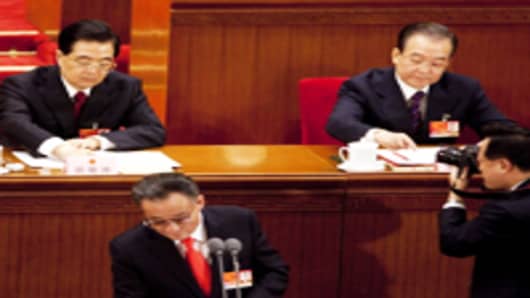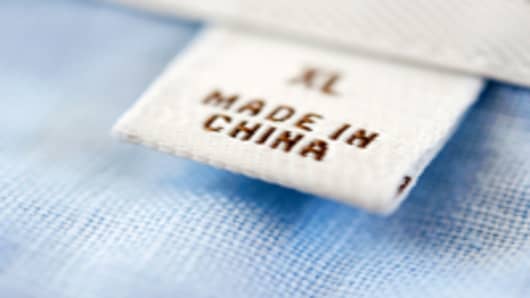Despite reporting strong growth in 2011, China's stock market significantly underperformed other markets. It shows that China's growth has too much waste in it. Hence, businesses are not adding value as growth would normally do. Such inefficient growth leads to inflation.
China hasn't moved away from quantity expansion on the supply side and government investment plus exports on the demand. As China has exhausted its blue collar labor pool, quantity expansion without improving productivity leads to inflation. After the global financial crisis in 2008, China has become more dependent on government investment to support demand.
The waste appears to have escalated with this increased dependency, which is an added source of inflation.
Monetary stimulus without reforms merely funds the inefficiencies to sustain growth. It obviously makes inflation worse. The recent cooling of inflation statistic was partly due to declining prices of oil and other commodities. Also, it is partly a statistical phenomenon. Most people still feel high inflation. As oil price backs up, the transmission of money into inflation becomes quicker.
Chinese banks have loosened lending to most industries. The property development sector is an exception so far. The increased lending will prevent the liquidation of high inventories, especially commodities like steel and coal. Any economic bottom is marked by inventory liquidation.
This phenomenon is more pronounced in China, because inventories are often for speculation and, hence, very high relative to final demand. The increased bank lendings allow the inventory speculators to hold on and hope for a price turnaround. This force delays the market clearing process.
While GDP data may appear better than expected. It shouldn't be celebrated.
The liquidation is merely postponed, not removed.
An Uninspiring Budget
The 2012 budget could have improved the economy significantly in the short and long term by cutting taxes meaningfully, say, above 1 trillion yuan. The budget seems to support status quo. It increases 2012 fiscal spending by 14 percent. This is not the best China could do. As the economy faces so many structural problems, the budget could have taken a significant step forward.
Chinese businesses suffer from high and sometimes arbitrary tax burdens.
The World Bank points out that 45 percent of the labor cost for businesses goes to the government, higher than in most developed economies. Of course, businesses pay workers less to offset the payments to the government. This is a significant factor in contributing to China's weak household demand.
Inflation has decreased the household sector's ability to grow consumption especially for low income people. The doubling of food price in recent years hits the low income households disproportionately hard.
On the other hand the government expenditure has marched on relentlessly.
It is fair to say that most demand, including infrastructure, property, and State Owned Enterprises' (SoE) capex, in China's economy is government-driven. The market-driven portion, mainly household consumption and exports, is smaller.
Government-driven demand is apparently inefficient. Investment cost is often 20-30 percent higher than what private companies can deliver for similar projects. Redistributing income to the private sector could improve economic efficiency substantially. Hence, a major tax cut could cool inflation and support growth for two years. Unfortunately, this opportunity was missed.
China's Weakest Link
While cutting taxes can support economic growth for a year or two, growing competitive companies is the only path towards high income for all Chinese people. Quantity expansion can generate low level prosperity. By tapping into unused labor and natural resources, China has risen to $5,000 per capita income. This is a laudable accomplishment. But, we also need to recognize that China is one of the last economies in East Asia to do so.
Wars and revolutions held back China's economic development. What has happened in the past three decades is to make up for the lost time.
In the past decade China's economy has quintupled in U.S. dollar terms and become the second largest in the economy. But few globally competitive companies have emerged in the growth boom. Other economies that have experienced such booms all had well-known and globally competitive companies to speak of. As China's boom is happening on a larger scale than any other economy before, there ought to be even more and bigger global players to emerge. Huawei Technologies may be the sole exception. It has clearly become a global player in its space. Even worse is that the companies that were promising in the 1990s have regressed, now relying on state support or financial speculation to survive.
Losing the Competitiveness Race
A decade ago Korea's Samsung Electronics and Hyundai Motors were not that much better than their Chinese counterparts. Now no Chinese semiconductor company is even remotely competitive against Samsung. Similarly, Chinese automobile companies, while making much noise about taking over this and that, are far behind what Hyundai can do.
Samsung Electronics then emerged from the Asian Financial Crisis barely alive. Manufacturing of memory chips, a capital intensive commodity business, was its main business. If the Korean government hadn't helped, it would probably have gone under in 1998. China began its push into the chip sector at about the same time and could have surpassed Samsung easily with the right organization. After all, China was emerging to be the global electronics manufacturing center and, hence, the demand center for chips.
A decade later China has indeed become the biggest source of chip demand.
But Samsung and TSMC dominate China's market. Samsung has taken advantage of China's market and grown to probably the best semiconductor and electronics company in the world, while China's electronics manufacturers are stuck in price competition and domestic chip manufacturers are small in scale and weak in technologies.
China has become the largest automobile market in the world too. But no domestic producer has become either a major competitor at home or abroad.
While most cars are made in China, key components are imported, because foreign companies want to protect their technologies from Chinese learning.
China's automobile industry has this truncated structure with oversupply and low profitability in downstream assembly, while foreign companies reap huge profits through controlling key components and technology know-how. The big three German companies have done especially well. While they sell globally, most of their profits are from China.
The chemical industry is another such example. China's quantity based development model has led to excess capacity and low profitability in low-end products, while foreign companies import China's cheap supplies and sell back to China at high prices after adding value with technologies and know-how that China doesn't possess.
Global Companies Have Optimized Against China
Multinational companies have all restructured around China, shedding low-end production to China and expanding high-end production while protecting their know-how and technologies. This strategy has worked remarkably well.
Traditional industries like automobile and chemical have been reporting good profits even during a global downturn. They are supposed to be commodity industries and suffer sharp profit decline during a downturn. The new dynamic is due to China's market and development model. China sells at low prices of the low end products that form the inputs for global companies.
Through adding value and controlling supplies, they can sell to Chinese buyers at high prices. In that regard, industry consolidation is an important element in this relative pricing dynamic.
Globalization means that no country should do everything. Hence, some industries will be dominated by foreign companies. But, China is an extreme example. No country has developed in such a way with almost all important industries dominated by foreign companies. The above three examples illustrate the point. Most other industries are in a similar shape. Does the foreign dominance make China's prosperity fragile?
This phenomenon has occurred despite China's supposed economic planning under the all powerful National Development and Reform Commission (NDRC). The results demonstrate that China's industrial policy has failed.



